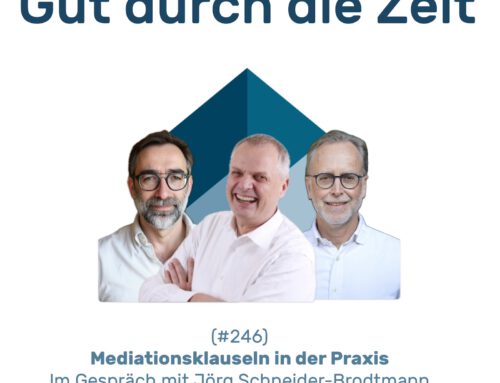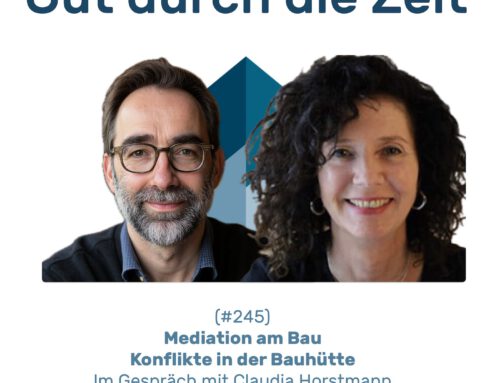INKOVEMA Podcast „Well through time“
#216 GddZ
The German Corporate Governance Code
Does the German Corporate Governance Code provide a field of application for mediation – or even recommend it?
In conversation with Dr Daniela Rindone
Dr Daniela Rindone, Lawyer and mediator at CMS Germany in Cologne, labour law, where she works as Counsel and Co-Head of the CMS New Work Competence Cluster. She advises national and international clients on all aspects of individual and collective labour law. One focus of her work is the introduction of modern forms of work and advising companies in particular on the topics of mobile working, home office and employee management in remote forms of work.
Dr Rindone was a lawyer at CMS from 2013 to 2016 and then moved to the position of in-house lawyer in the central employment law department of a multinational company and major automotive supplier. She returned to CMS in 2018 and has been Counsel at the firm since 2022. In addition to her legal practice, Daniela Rindone works as a mediator specialising in commercial mediation.
Contributions from the conflict dynamics
Well through time.
The podcast about mediation, conflict coaching and organisational consulting.
Contents
Chapter:
0:10 – Welcome to the podcast Gut durch die Zeit
3:01 Mediation in labour law
8:21 The Governance Code
16:09 Significance of the Corporate Governance Code
21:14 Stakeholders in corporate governance
25:39 Trustful cooperation and mediation
28:22 Mediation in a business context
42:56 Mediation and Corporate Governance Codex
43:48 Farewell and outlook on future topics
Summary of content
In this episode, we shed light on the Role of mediation in the context of the Corporate Governance Codea Rules for good corporate governance. I am delighted to welcome Dr Daniele Rindone, an experienced lawyer with a focus on employment law and mediation training, as a discussion partner. Our discussion will begin with an introduction to the Fundamental issues of mediation and how they relate to the Principles of trusting cooperation in professional life can be connected.
Dr Rindone explains how her professional career has led her to work both in her role as a legal advisor and as a mediator. Through her experience, she has developed a deep understanding of the dynamics of conflict on both an individual and organisational level. We will discuss how mediation can act not only as a conflict resolution process, but also as a catalyst for better collaboration and innovative solutions within organisations.
Things get particularly interesting when we take a closer look at the Corporate Governance Code. Dr Rindone explains that the Code formulates fundamental principles for corporate governance that promote open and trusting communication between the responsible bodies should. Here we see the Connection to mediationas it makes it possible to unite different perspectives in conflict situations and find viable solutions for all parties involved. The gateway for this interpretation is the Legal term „trustful cooperation“.
We delve into the practical differences between the role of a mediator and that of a legal adviser. Dr Rindone highlights the importance of stepping back and being neutral in a mediator role to give the parties in conflict space to negotiate for themselves. She shares her insights on how key stakeholders such as supervisory boards or management boards can be persuaded to consider mediation as a useful conflict resolution method, especially when conflicts are stagnating or tending to escalate.
We also look at the challenges of mediation in highly professional and complex corporate contexts and discuss how the Corporate Governance Code can promote a positive attitude towards mediative approaches. Dr Rindone argues that the Code can strengthen trust between boards, which has a positive long-term impact on corporate governance.
Overall, this episode offers deeper insights into the valuable synergies between mediation and corporate governance, and we invite listeners to reflect on these perspectives in their own professional contexts. Dr Rindone concludes with the conviction that mediation should be given more attention, not only as a technical process, but also as a necessary component of a proactive conflict culture in companies.
CONTEXT of the CODEX
KODEX. The German Corporate Governance Code sets out key statutory regulations for the management and supervision of German listed companies and contains internationally and nationally recognised standards of good and responsible corporate governance in the form of recommendations and suggestions.
COMMISSION. The Government Commission on the German Corporate Governance Code formulates these recommendations and suggestions and reviews them annually to determine whether they continue to correspond to best practice in good corporate governance or whether they need to be adapted.
COMMISSION IN DIALOGUE. As the Code is an expression of the business community's commitment to good corporate governance, the review takes place not only within the Commission, but also in dialogue with companies and their stakeholders, politicians and the public. The public consultation process, personal discussions and other dialogue formats are forums that ensure this involvement.
OBJECTIVES: The GCGC is intended to help make the rules for corporate management and supervision applicable in Germany comprehensible and transparent for both national and international investors. This is intended to strengthen confidence in the corporate governance of German companies and thus in the German capital market. The Code takes into account the points of criticism levelled at the German corporate constitution in the past - particularly by foreign investors - including inadequate alignment with shareholder interests, a lack of transparency in corporate governance and a lack of professionalism, diversity and independence on supervisory boards. The aim is also to harmonise and standardise the measures that are part of good corporate governance.
Furthermore, the Code aims to provide German companies with rules and values for good and responsible corporate governance. Above all, this means that companies should endeavour to achieve their corporate goals in a way that serves the company itself as well as the affected interest groups such as owners, lenders, customers and suppliers, society and citizens from a long-term perspective.
At the same time, the Code aims to provide investors and shareholders with a catalogue of criteria for assessing good corporate governance.
Complete transcription




Leave A Comment